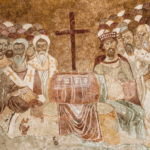(This post was originally published in September 2016 but updated in the wake of the author’s lengthier series on the Story of Gender)
Calvin’s famous observation that our knowledge of ourselves and our knowledge of God affect each other received further vindication in August of 2016 when Rabbi Mark Sameth published a provocative article on the gender of God in the New York Times.
Sameth argued that historical and grammatical clues suggest that the God of Israel was once regarded as having a fluid gender. These arguments are very weak and were duly exposed by biblical scholars elsewhere (see, for example, here and here).
But does God have anything to do with gender? That’s a theological question which is a bit harder to answer.
The Short Answer
On one hand, there’s a short answer: gender is connected to biological sex and God doesn’t have biology. God is spirit (John 4:24). He doesn’t have a body—he doesn’t have chromosomes or genitals or any of the physical markers of gender. Physical attributes like that belong to the demigods of paganism, not to the utterly transcendent and omnipresent God of Scripture.
We should note in passing that this short answer isn’t disproved by the incarnation. The gender of Jesus is something that belongs to his human nature which mustn’t be confused with his divine nature. Jesus’ masculinity no more proves that God is male than that it proves that he is Jewish or mortal.[1]
A Longer Answer
Yet gender in the Bible isn’t just to do with biological essences; it’s also about the structure of relationships and the story of origins. Genesis introduces us to the reality of gender through the need of the first man for a companion suitable for (and taken out of) him (See more on the origins of gender here).
This pattern still doesn’t apply to the inner life of God. The persons of the Trinity are Father and Son—not husband and wife: the eternal Son doesn’t complete the Father like Eve completes Adam.
On the other hand, the terms Father and Son do point to connections between human males and God. As fathers, men transmit their own image and likeness to their offspring (Gen 5:3). In the Old Testament human fatherhood is the mainspring through which nations, blessings, curses and covenants flow out into the world. Both of these aspects of fatherhood derive from God. He, according to both Scripture and orthodox tradition, is the eternal Father who has always had a Son in his likeness (eg. Heb 1:2; John 1:14). In relation to humanity, God is the true Father—the one from whom our identity and blessings come: the father (patér) from whom all patriarchal lines (patria) derive their name (Eph 3:14 c.f. Acts 17:28-29).[2]
These matters force us to think more deeply about the way revelation works. Here are five principles to keep in mind:
1. Humans are made in God’s image—not vice versa.
It’s unavoidable that our knowledge of God begins with anthropomorphism. When children hear God described as “Father” it is natural that their first instinct should be to understand this in light of their earthly father. The same goes for every other adjective that applies to God: loving, good, wrathful, patient, just etc. The only reason we can begin to make sense of these words is because they express some commonality between us and God. The words God uses when he speaks to us derive from the creation that he has already set up for that purpose.[3]
Nevertheless, as we come to a deeper understanding, we realise that those initial impressions need to be overhauled. God isn’t a bigger version of my dad; rather, fathers are sketchy (and sometimes tragically misleading) reflections of God. God’s true fatherhood is different from ours—not just in its moral style, but also in its structure. The fatherhood of God is eternal and necessary.[4] It produces a son who is perfectly like, and inseparable from, his Father.
2. We can’t work out how creation talks about God without Scripture.
As analogies created by God, we humans are both like and unlike our creator. The “like” part means that it’s possible for us to have some limited knowledge of God. The “unlike” warns us not think we can know about God by simply thinking about our own experience of the world. We need Scripture to teach us how to think about both him and ourselves. We need its emphases and norms to govern our own understanding.
We also need to pay attention to the different ways the Bible uses its metaphors and analogies. For example, when the Bible says God is a consuming fire (Deut 4:24), it’s a simple metaphor—a teaching device to help us understand the danger of disobeying God. Yet when John writes that “God is love” (1John 4:7-8) he’s working in a different register. “Love”, as we humans know and experience it, is itself an analogy of the true Love that existed before the creation of the world (John 17:24).[4]
3. We mustn’t try to fix the Bible.
Observing these principles helps us avoid two false solutions to the problem of God’s gender.
One error is to try to redress the Bible’s use of masculine terminology for God by emphasising those moments where feminine imagery is used of God: God is like a bear with her cubs (Hos 13:8); or a comforting mother (Is 66:13); or a woman in labour (Is 42:14).
It’s good for us to be reminded that these verses exist. And we must also remember that all of us, men and women, are made in God’s image—all of us share in God’s rule over creation (Gen 1:26). And women, as well as men, sometimes represent God as political leaders, prophets and priests.
Yet these facts don’t give us license to adjust the language of the Bible—to start mixing in feminine pronouns, for example, or calling God “mother”. God may well be like a mother in some ways, but Scripture tells us that he is the Father. Only God has the right and the ability to tell us how the analogies of creation work. Only he knows how to use the symbols that he has created to talk about himself.
4. We mustn’t over-interpret the Bible.
The converse danger is that we need to keep a watchful eye on the limits of the analogies and metaphors used by Scripture. If God is a Father it does not mean that he must have a consort or that he came to be a father at a point in time—even though that is what the term would connote in our reality. Nor, for the purposes of this discussion, does it mean that God is “male”. Although the Bible uses terms that we associate with masculinity, it never takes that extra step. Nor are we free to make our own deductions in that direction. It is certainly significant for our understanding of the significance of men—particularly Fathers—that God chooses to express himself in such masculine terms and pronouns. But it doesn’t mean that God is a man.
5. When God Became Male
Nevertheless.
I said above that the masculinity of Jesus doesn’t make God male. That’s true, but it’s also more complicated than that. As Paul indicates in Ephesians 5:21-32, Jesus is the true man, the true husband whose relationship with his people is the true marriage. Human gender and human marriage are a “mystery”—a secret revealed with the gospel (v 32)—that points to the spiritual oneness between Christ and his people (see more on this here).
So, in the end, gender does have something to do with God. While God is neither male nor female, the human categories of masculinity and femininity themselves testify to God’s relationship with us. By becoming human and uniting us to himself, God the Son didn’t just pay for our sins and give us new life, he also married us. He fulfilled gender and revealed its true meaning. The categories “man” and “woman” turn out to be finally about him.
Summing Up
The question of whether God has gender helps us see some of the different ways human existence relates to God’s reality.
- We are all created in God’s image and represent God in different ways, but God has set up some aspects of our nature in such a way that they feature prominently in his revelation of his own nature (i.e. God’s communicable attributes). Love and fatherhood appear to be in this category; male and female do not.
- Other aspects of human nature are prepared such that they help us understand God’s relationship to us. Gender falls into this category.
The coming of Christ illuminates and transforms our understanding of both these categories. In Jesus’ relationship to God, we finally see what “Father” and “Son” and “love” (and many other things) really mean. In Jesus’ relationship to his people we find out “man” and “woman” and marriage are all about.
God is not a man; or like men. But we are made in his image, and there is one man who finally teaches us what it is to be human, and male, and female, and children of God. He is the final word on what our gender has to do with God.
[1] Which is not to deny that there is a sense in which we can say, for example, “God died on the cross”. But such statements are made to show that Jesus is the same person as the eternal Son—not to prove that his divine nature can die.
[2] The point being that as father “Israel” begets a family (patria) named after him, so God—the ultimate Father (patér) is the source of family (patria) itself. Every human family (patria) bears two names: the name of its human progenitor and the name of God (patér).
[3] Or, to say the same thing in the language of theologians—the analogia fidei requires an analogia entis
[4] Some might want to say that it isn’t an analogy but is the same: God and we both love, and the word means the same thing. The problems with this become apparent when we try to imagine how the perfect persons of the Trinity might show love to one another outside time and space and any sense of need. Perhaps a better way to put it might be to say that our love and God’s love are “literally” the same but not univocally identical. So, God the Father and God the Son truly love each other in eternity and while Jesus is on earth, yet the first reality (of which the second is an analogue) is infinitely beyond our understanding.














